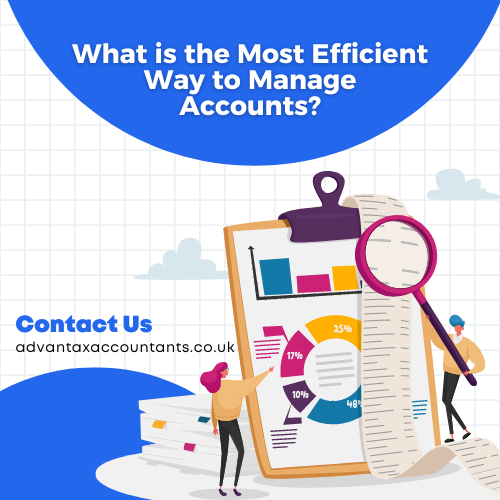Starting a business can be an exciting chapter in life, and managing accounts as a small business can be a difficult task. It can be tempting to put all your energy into the aspects of entrepreneurship that give you the most joy and reward. However, it’s crucial not to be doing this at the expense of less exciting yet equally important aspects of operating a business for example, “managing accounts”
The first thing to put into the right place is the “financial record”. If your company’s financial records aren’t properly managed it could cause serious difficulties for your business when it comes down to managing tax and cash flow.
On the other hand, making sure it is done right at the beginning will set the tone for any company, resulting in greater profits and performance in the longer run. You do not need to be a math genius to manage and prepare your finances as a small-scale business. All you require is an understanding of basic bookkeeping and finance.
What Exactly are Manage Accounts?
Accounting management is about keeping track of transactions and organizing them as well as preparing invoices and keeping receipts. How you manage and use data in a business setting is crucial to the long-term viability of your company. You need to establish a clear and easily manageable method of recording and retrieving financial information regarding your company. This will assist you in taking the time to complete your company’s tax return, registering your company’s accounts at Companies House, and monitoring your cash flow and the number of profits available.
The financial transactions that occur within your business are broken down into various accounts that allow you to determine where the money is getting and where it’s being utilized by the business. This kind of classification will allow you to view the liabilities, assets, and income as well as expenses for the business, and then create financial statements, such as Profit loss balance, and the balance sheet.
Traditionally, companies had a paper book that was printed for each account, also known as a ledger. However, nowadays, this information is kept by a computerized ledger system that is a lot simpler to manage.
Bookkeeping Basics
Bookkeeping is the process of recording, storing, and retrieving information when you need to make financial transactions (i-e the money that enters and leaves your company). Some of the most frequent bookkeeping tasks are:
- Recording and storing purchase receipts
- Verifying and recording invoices from suppliers
- payment to suppliers
- Reconciliation of bank
- making and sending invoices out to customers/clients
- tracking payments and chasing them for late payments
- managing your PAYE
Preparing profit and loss accounts as well as balance sheets and financial reports.
Accounting/bookkeeping software makes work easier for many of these tasks, saving small businesses much time and money. A few businesses use traditional bookkeeping software that is more time-consuming and has little value.
What should I Look for When Buying Accounting Software?
Most accounting software packages will contain the following functions
Automated Double entry bookkeeping. Once you’ve learned how to utilize your accounting software, you will get acquainted with the process for double-entry bookkeeping. Many accounting programs automate this process to make sure your accounts remain balanced.
Automate the creation of invoices. When you make an order to your customers the majority of accounting software will create a sales invoice which is sent to the client as an invoice detailing the amount to be paid (Including VAT, if applicable) and the product or service they purchased, as well as the available ways to pay. If the payment was not due at the time of sale, then the invoice may also include the date of payment and an early discount for payment.
Create and modify reports and edit them. One of the major benefits of an accounting system that is computerized is the ability to quickly produce financial reports. They are especially useful for completing your tax return and sending your financial statements to Companies House.
Automatically calculate VAT on your own. A lot of accounting software supports automated VAT tracking. This allows you to record the number of your purchases and sales and simultaneously alter a Control account to account for VAT. After the VAT period, you will view the net liability that will help you complete your tax return.
Control the flow of cash. It is essential for any business to be aware of its cash flow. This allows them to make sure they have enough funds to conduct their day-to-day business.
Additional payroll modules. A majority of accounting software vendors can provide an extra payroll component that can be integrated into the main accounts package. When you pay employees or yourself the software will be able to automatically send details of your payroll to the appropriate accounts, which allows you to monitor your tax obligations for payroll and also how much you’ve spent on each employee.
Making the Job Easier
It is important to ensure you have your records of financial transactions (aka your books or accounts) properly maintained should not be difficult, but even if you are doing it yourself, it will require determination, discipline, and organization. Making time every week to review your books will make the process much simpler. Adopting the “little and often”” approach can ensure that your accounts and books don’t turn into something you are trying to avoid.
The investment in accounting software that is cloud-based will help you with the task and will save you time and money while giving you a better understanding of how your company is doing, managing your finances, and ensuring your cash flow stays in good shape.
What is the Most Efficient Way to Manage Accounts?
Many companies choose to hire an accountant with a portion or all accounting duties. But for those who prefer to save money, or don’t have the money to fund this type of service (which is the most common case for startups) then the best option is to take on the task yourself. Personally, I believe that it’s an essential skill that should be learned and, as a leader in business, it can put you in a position of strength when you have to make financial decisions for your business in the future. I would not suggest you study the finer points of accounting, but a foundational understanding of the subject will allow you to manage expenses and make better choices. Also, you must remember the reasons you set out to start a business initially and it’s much more likely than not that you will control your finances, so the balance has to be negotiated by weighing the amount you manage by yourself and the amount you outsource.
If you decide to manage your business accounts in-house, the simplest and most secure method is to utilize a cloud-based service. It is totally accessible for free and is perfect for people with little knowledge of bookkeeping and accounting. Utilizing cloud-based service you can create professionally designed invoices, integrate into payment platforms such as PayPal, Worldpay, and GoCardless and label all of the transactions you make for your company directly on your statement.
Employing the Help From a Bookkeeper or a Tax Accountant
If you have the money of running your own books or hiring an outside person to manage the work, you can employ an outside bookkeeper. They may work at your location as well as remotely in their home. Bookkeepers can also provide additional services, like creating quotes, invoicing, reconciliation of banks, and more.
It is also possible to hire a tax accountant to prepare the tax return, record your books and provide advice regarding tax efficiency. External assistance from a professional will not only guarantee that your bookkeeping and tax compliance are performed to the highest standard and in a timely manner but help you concentrate on other tasks you like or will add more worth to the business.
To save costs Many business owners choose to manage their own bookkeeping or perhaps employ a tax accountant to handle more complicated tax issues.



